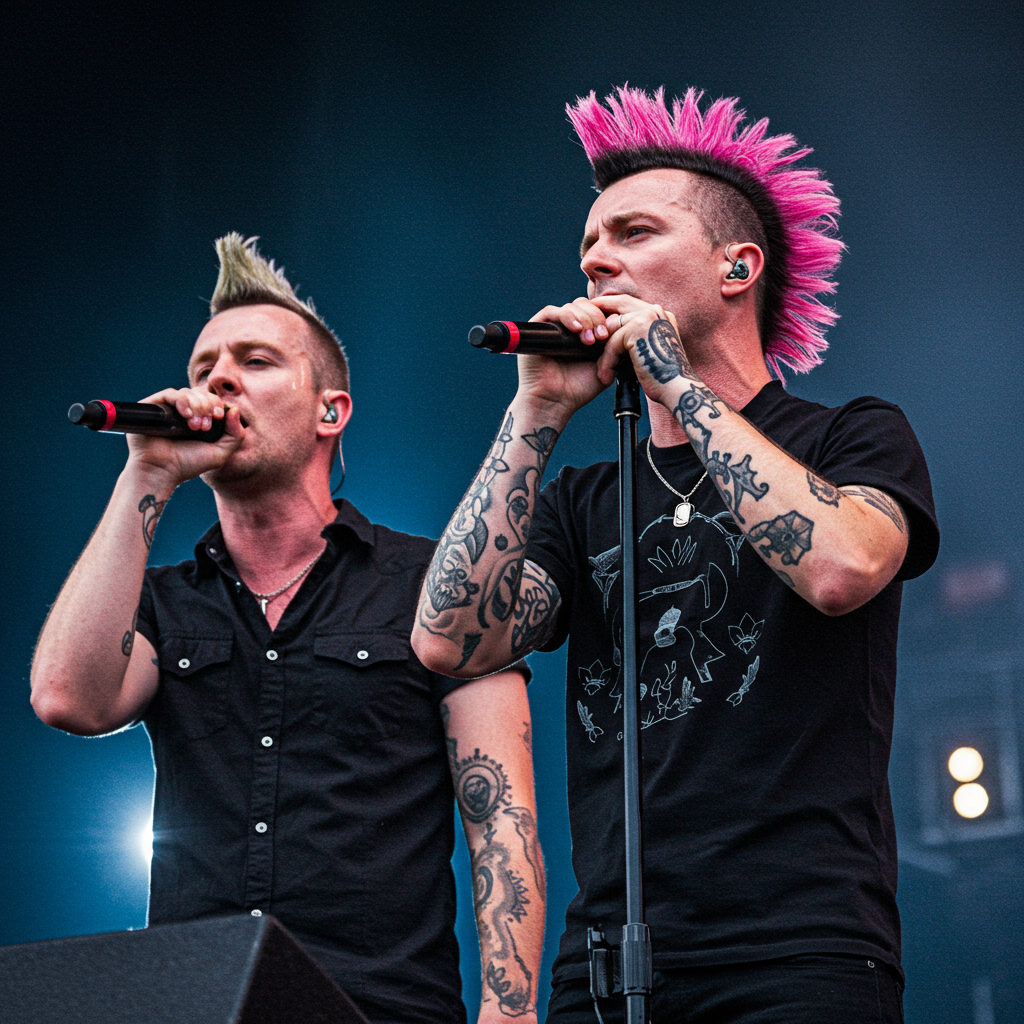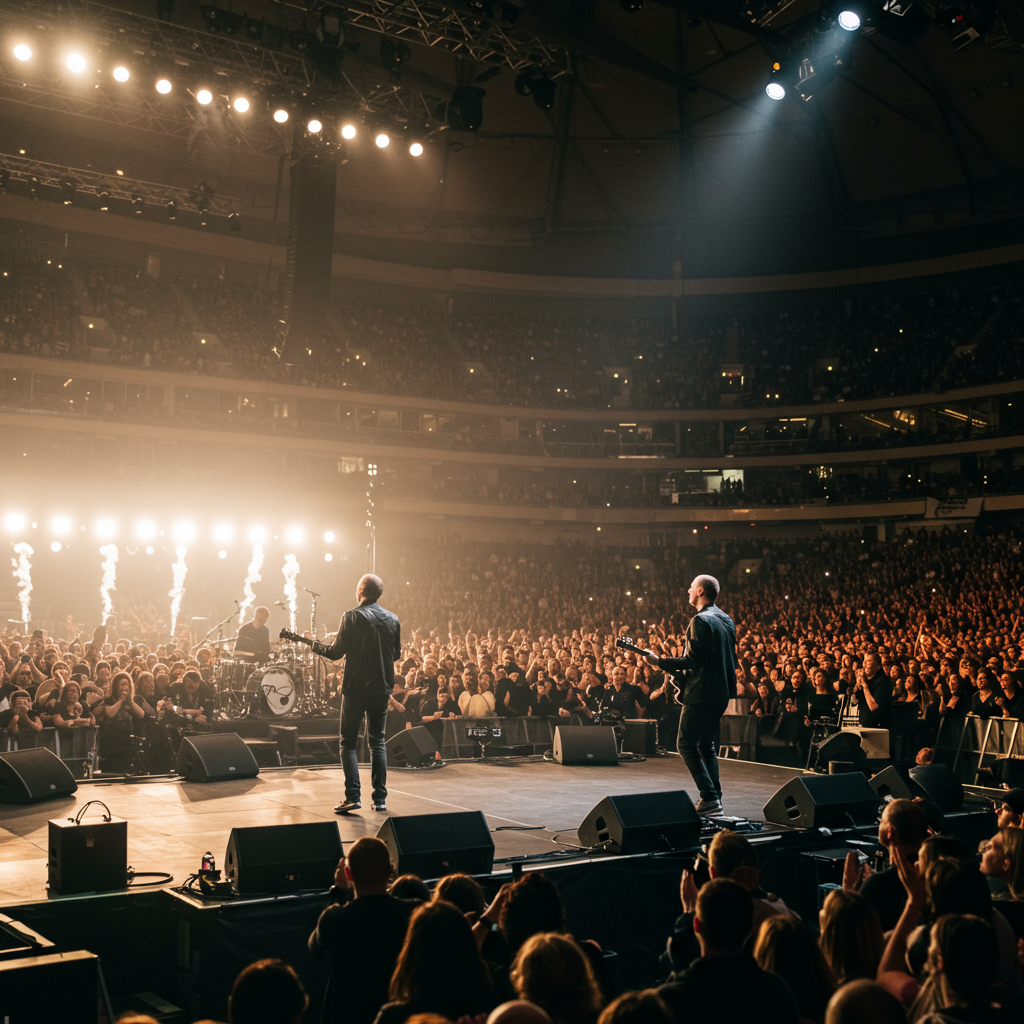Controversy erupted at glastonbury festival 2025 following the Saturday performance by British punk and hip hop duo Bob Vylan. Onlookers and officials alike reacted strongly after the band reportedly led the audience in politically charged chants. This incident triggered swift condemnation from festival organizers and the BBC, reigniting debates surrounding free expression, hate speech, and the responsibilities of artists and platforms in politically sensitive times. The fallout included calls for investigation and sharp criticism of how the event was handled by both the festival and the broadcasting corporation.
Bob Vylan’s Glastonbury Set Triggers Outcry
During their set on the West Holts stage on Saturday, June 28, 2025, Bob Vylan, composed of vocalist/guitarist Bobby Vylan and drummer Bobbie Vylan, engaged the crowd with explicit political messaging. Reports indicate the duo initiated and led chants including “Death, Death To The IDF” and “Free, Free Palestine.” They also reportedly used the phrase “From the river to the sea, Palestine must be, will be, free,” a slogan widely considered offensive and interpreted by many as a call for the destruction of Israel.
The performance immediately drew attention and criticism. The specific nature of the chants, particularly the call referencing the Israel Defense Forces (IDF), was a central point of contention. This occurred amidst ongoing global tensions related to the Israel-Palestine conflict and less than two years after the October 7th attack on a music festival in Israel, a context highlighted by some critics.
The performance took place shortly before the Irish rap trio Kneecap were scheduled to perform on the same stage, another act that had faced controversy regarding their political stances and previous actions. This sequencing added a layer of complexity to the unfolding situation at the festival.
Festival Officials Respond: “Appalled” and “Crossed a Line”
Glastonbury Festival organizers were quick to issue a formal response to the Bob Vylan performance. On Sunday, the festival released a detailed statement expressing their strong disapproval of the actions taken from the stage.
The statement began by reaffirming Glastonbury’s foundational principles, describing the festival as a place created in 1970 for people to unite and celebrate music, arts, and human endeavor. Organizers emphasized their stance against all forms of war and terrorism, stating their unwavering belief in and active campaigning for hope, unity, peace, and love.
Acknowledging the sheer scale of the event, which features nearly 4,000 performances, the statement noted that the festival recognizes it will host artists and speakers whose views are not universally shared. They clarified that an artist’s presence at Glastonbury should not be interpreted as an endorsement of their opinions or beliefs by the festival itself.
However, the statement drew a clear distinction regarding the Bob Vylan set. Officials explicitly stated they were “appalled” by the statements made from the West Holts stage. They asserted unequivocally that the chants “very much crossed a line.” Festival organizers are now “urgently reminding everyone involved in the production of the Festival that there is no place at Glastonbury for antisemitism, hate speech or incitement to violence.” This strong condemnation underscored the festival’s position that the content of Bob Vylan’s performance went beyond acceptable boundaries.
Defining the Boundaries: Antisemitism and Hate Speech
The festival’s statement specifically mentioned “antisemitism, hate speech or incitement to violence.” This phrasing aligned with how various commentators and officials subsequently characterized the chants. The use of the “From the river to the sea” slogan is frequently debated, with proponents viewing it as a call for a unified Palestinian state, while critics, particularly within Jewish communities, interpret it as a call for the elimination of Israel and displacement of its Jewish population, often deeming it antisemitic. Chants directly calling for “Death” to a specific group like the IDF are widely seen as incitement to violence.
The festival’s clear denunciation indicated a judgment that Bob Vylan’s actions fell squarely into the categories they reject. This position sets a precedent for what Glastonbury considers unacceptable discourse on its stages, even within genres known for provocative content.
The BBC’s Handling of the Live Stream
The controversy extended beyond the festival grounds to its broadcasting partner, the BBC. The BBC live-streamed the Bob Vylan performance on its iPlayer platform, leading to significant criticism for airing the controversial chants without interruption.
A BBC spokesperson described Bob Vylan’s set as “deeply offensive,” acknowledging that some of the comments made were highly objectionable. While the live stream reflected the events on stage, the BBC did issue an on-screen warning to viewers during the broadcast about the presence of “very strong and discriminatory language.”
Despite this warning, the decision not to cut away from the performance immediately drew fire. The live stream remained available on iPlayer for several hours after the set concluded before being removed. The BBC later confirmed it had “no plans to make the performance available on demand,” effectively pulling the content from its platform.
Regulator and Political Backlash
The BBC’s handling of the broadcast prompted scrutiny from media regulator Ofcom. Ofcom reportedly contacted the BBC shortly after the event, urgently requesting information regarding the procedures in place to ensure the broadcast complied with the BBC’s editorial guidelines. The regulator indicated it was “very concerned” about the live stream, suggesting the BBC “clearly has questions to answer.”
Prominent UK politicians also weighed in, demanding explanations from the BBC. Prime Minister Keir Starmer condemned the chants as “appalling hate speech” and called on the BBC to clarify how they were broadcast. Shadow home secretary Chris Philp suggested the BBC might have broken the law by broadcasting the performance and called for police investigation and prosecution of both the band and potentially the BBC. Health Secretary Wes Streeting and Culture Secretary Lisa Nandy were among others who publicly questioned the BBC’s actions. Conservative leader Kemi Badenoch labeled the scenes “grotesque,” stating that “glorifying violence against Jews isn’t edgy.”
This intense political and regulatory reaction underscored the seriousness with which the broadcast was viewed by many, particularly given the timing and the specific nature of the language used.
External Criticism and Broader Context
Beyond the official responses, the Bob Vylan incident drew sharp criticism from external groups, most notably the Simon Wiesenthal Center, a Jewish human rights organization.
The Simon Wiesenthal Center issued a scathing critique of both Glastonbury and the BBC. Jim Berk, CEO of the organization, called the performance “sickening, dangerous and chillingly reminiscent of a modern-day Nazi rally,” asserting it was “public incitement, not performance.” He was particularly critical of the BBC for broadcasting the chants live without interruption, arguing this action “gave hate a stage, a microphone, and the stamp of legitimacy.”
Berk found Glastonbury’s official response inadequate, labeling it “bland” and “cowardice.” He specifically criticized the festival’s statement for saying the chants merely “crossed a line” and offering “vague ‘reminders’ to artists,” arguing that anything less than “absolute condemnation and corrective action” in response to explicit calls for violence against Jews constitutes “complicity.”
He drew a direct parallel to the Hamas attack on Israel’s Nova music festival in October 2023, stating that Vylan’s chants were “deeply re-traumatizing and terrifying” in this context. The Simon Wiesenthal Center framed the event as a “moment of reckoning,” urging festivals, media, and artists to choose whether to be “platforms for peace, or enablers of hate.”
Avon and Somerset Police, responsible for policing the festival area, stated they were reviewing video evidence to determine if any offenses had been committed that would warrant a criminal investigation. The Israeli Embassy in Britain publicly condemned the comments made at the festival as “inflammatory and hateful rhetoric.”
The incident sparked debate about the nature of punk music and political expression. Some commentators, like Ash Sarkar, suggested that provoking controversy is inherent to the genre, asking why punk bands are booked if provocative behavior is not desired. However, critics argued that while challenging norms is part of music, direct incitement to violence or hate speech crosses a fundamental ethical and potentially legal line.
The Bob Vylan controversy at Glastonbury 2025 highlighted the complex challenges faced by large festivals and media outlets in navigating highly charged political speech from artists, balancing principles of free expression with the responsibility to prevent the promotion of hate speech and incitement to violence.
Frequently Asked Questions
What specific chants did Bob Vylan make at Glastonbury?
During their performance on the West Holts stage at Glastonbury Festival 2025, Bob Vylan reportedly led the audience in several politically charged chants. These included “Death, Death To The IDF” (referencing the Israel Defense Forces) and “Free, Free Palestine.” The duo also reportedly used the slogan “From the river to the sea, Palestine must be, will be, free.” These specific phrases triggered the subsequent controversy and official condemnations.
What actions did Glastonbury and the BBC take in response to the performance?
Both Glastonbury Festival organizers and the BBC issued statements condemning the Bob Vylan performance. Glastonbury officials stated they were “appalled” by the chants, asserting they “very much crossed a line” and that there is “no place at Glastonbury for antisemitism, hate speech or incitement to violence.” The BBC described the set as “deeply offensive,” displayed an on-screen warning during the live stream on iPlayer, and removed the performance from its on-demand service, stating they had “no plans to make it available.”
Why did the Simon Wiesenthal Center criticize the responses from Glastonbury and the BBC?
The Simon Wiesenthal Center, a Jewish human rights organization, strongly criticized both responses, deeming them inadequate. The CEO described the performance as “sickening” and “incitement,” not just a performance. He argued that by broadcasting it live, the BBC “gave hate a stage.” He called Glastonbury’s response “bland” and “cowardice” for stating the chants merely “crossed a line,” asserting that anything less than “absolute condemnation and corrective action” in response to explicit calls for violence constitutes “complicity.” The organization felt the responses failed to grasp the severity, particularly in the context of the October 7th Nova music festival attack.
Conclusion
The Bob Vylan performance at Glastonbury 2025 sparked a significant controversy, drawing condemnation from festival organizers, the BBC, UK politicians, and human rights groups. The specific chants used by the duo were widely interpreted as hate speech and incitement, leading to swift and strong reactions from official bodies who deemed the language unacceptable for the festival stage. The incident also put a spotlight on the BBC’s broadcast decisions, prompting questions from regulators and critics about the handling of live controversial content. While debates surrounding freedom of speech in artistic expression are ongoing, the consensus from many quarters was that the language used by Bob Vylan crossed a fundamental boundary, leaving the festival and broadcaster to navigate the fallout and reaffirm their policies against hate speech.



